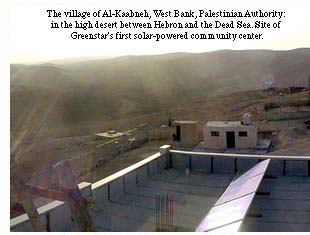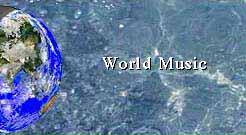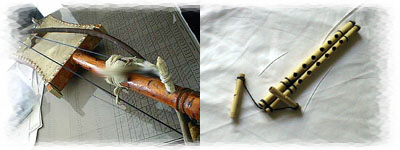Greenstar's
World
Music
was
digitally
recorded
live,
direct
to
disk,
with
local
people
in
the
Palestinian
village
of
Al-Kaabneh.
Greenstar
engaged
professional
musicians
from
the
US
and
from
Palestine,
working
together
to
record
the
unique
musical
voice
of
the
community.
Palestinian
musicians
who
know
traditional
Bedouin
music,
with
its
story-telling,
religious,
and
social
elements,
worked
on
this
collection.
They
know
the
music
that
children
learn
in
a
rural
village,
their
nursery
rhymes,
game-playing
and
sports
songs,
the
songs
one
hears
at
weddings,
births,
at
work
and
play:
the
daily
musical
sounds
of
a
community
that
traces
its
originas
back
almost
5000
years.
These
artists
spoke
in
depth
with
the
people
of
the
village,
identifying
musical
voices
and
rhythm
talent,
and
drew
forth
a
geniune,
heart-felt
performance.
They
are
fluent
in
Arabic,
and
knowledgeable
about
Palestinian
culture,
history
and
society.
Greenstar
provided
technical
support
and
equipment,
and
brought
two
professional
musicians
from
the
United
States
to
assist.
Alan
Roy
Scott,
a
professional
songwriter
and
producer,
was
on
hand
to
take
part
in
creative
decisions
and
instrumentation.
He
was
assisted
by
his
engineer
and
musical
accompanist,
Rick
Cowling.
Behind
the
Scenes
Before
our
recording
sessions
on
the
West
Bank
we
knew
this
would
be
a
challenging
environment:
a
new
musical
style
and
tradition,
new
musicians
and
instruments,
a
remote
location
with
no
standard
electrical
power
or
telephones.
 We
also
grappled
with
a
completely
unknown
quantity:
the
degree
of
musical
talent
of
the
village
people.
It
was
our
goal
to
engage
them
in
making
traditional
Bedouin
music,
an
ancient
tradition
virtually
unknown
around
the
world,
even
locally
elsewhere
in
Palestine.
We
also
grappled
with
a
completely
unknown
quantity:
the
degree
of
musical
talent
of
the
village
people.
It
was
our
goal
to
engage
them
in
making
traditional
Bedouin
music,
an
ancient
tradition
virtually
unknown
around
the
world,
even
locally
elsewhere
in
Palestine.
Fuad
Abulfotuh
is
a
Greenstar
engineer
from
Egypt
who
knows
the
people
well
because
he
directed
the
installation
of
the
large
solar
power
array
there.
Fuad
did
research
in
Palestine
and
identified
a
respected
songwriter
and
teacher,
Mohammed
Abu-Khater,
who
lives
in
the
south
part
of
Jerusalem.
This
master
of
the
oud
and
tabla
is
70
years
old
and
blind...and
full
of
musical
fire.
When
we
met
him,
by
his
intense
dignified
manner
we
immediately
thought
of
him
as
a
Palestinian
John
Lee
Hooker.
 We
brought
a
powerful
digital
recording
studio
with
us...in
a
briefcase.
With
today's
audio
recording
technology,
all
that's
needed
is
a
computer
with
plenty
of
storage
and
processing
power
(a
Macintosh
G3
laptop),
some
professional
microphones
and
stands,
and
a
small
8-input
mixing
board.
We
would
capture
sound
directly
into
the
Mac's
built-in
16-bit
digitizing
port,
using
Digital
Performer
software.
We
did
a
test
recording
session
in
a
livingroom
in
Los
Angeles,
and
it
all
worked.
We
brought
a
powerful
digital
recording
studio
with
us...in
a
briefcase.
With
today's
audio
recording
technology,
all
that's
needed
is
a
computer
with
plenty
of
storage
and
processing
power
(a
Macintosh
G3
laptop),
some
professional
microphones
and
stands,
and
a
small
8-input
mixing
board.
We
would
capture
sound
directly
into
the
Mac's
built-in
16-bit
digitizing
port,
using
Digital
Performer
software.
We
did
a
test
recording
session
in
a
livingroom
in
Los
Angeles,
and
it
all
worked.
The
final
ingredient
was
the
talent
to
set
all
this
up,
troubleshoot
and
operate
it
all,
amply
provided
by
our
engineer,
Rick
Cowling,
and
supervised
by
a
sklled
musician
and
songwriter,
Alan
Roy
Scott.
Our
first
visit
to
Al-Kaabneh,
after
a
long
ride
into
the
isolated
desert
south
of
Hebron,
was
a
shock.
The
people
of
the
village
said,
in
response
to
our
invitation
to
participate
in
some
music-making,
"We
don't
have
music
here."
They
explained,
"Music
is
for
celebration,
for
happiness.
It
has
been
a
long
time
since
we
had
anything
to
celebrate
or
be
happy
about,
so
we
don't
make
music,
we
don't
hear
it.
Our
young
people
have
never
heard
music."
This
was
a
potential
setback
for
our
recording
session
plans.
We
quietly
installed
and
tested
our
audio
equipment,
playing
a
little
music
as
we
worked,
as
curious
people
from
around
the
desert
gathered
to
watch
in
one
of
the
school
classrooms.
We
had
solid
electrical
power
from
the
solar
array,
and
all
the
equipment
worked.
But
there
was
nothing
to
record.
Behind
the
scenes,
our
advisor,
Fuad,
spoke
in
earnest
to
the
leaders
of
the
village
in
Arabic,
to
understand
the
message
behind
the
people's
words.
He
came
to
understand
that
the
people
of
this
community,
who
have
lived
in
the
area
for
thousands
of
years,
have
been
unable
to
maintain
a
stable,
permanent
presence
there
in
recent
years.
Many
live
in
tents,
scattered
across
the
desert
floor
and
on
the
rocky
hills;
others
have
corrugated-tin
shacks,
and
a
few
live
in
concrete-block
buildings.
But
tensions
between
the
Palestinians
and
the
Israelis,
who
control
the
area
with
security
forces,
are
such
that
these
traditional
Bedouin
people
have
not
felt
at
home
in
their
ancestral
land
for
many
years.
 Fuad
explained
to
them
that
Greenstar
is
designed
to
help
change
that:
to
provide
the
people
of
the
village
with
a
connection
to
the
outside
world,
a
means
of
producing
their
own
independent
income,
of
building,
in
their
own
small
local
way,
the
case
for
a
just
and
lasting
peace
between
Palestinians
and
Israelis.
He
explained
that
here
was
an
opportunity
for
the
people
of
Al-Kaabneh
to
find
their
strong,
historically
deep
voice,
and
to
share
it
with
the
world;
to
demonstrate
to
everyone
that
they
are
proud
of
their
great
traditions.
Fuad
explained
to
them
that
Greenstar
is
designed
to
help
change
that:
to
provide
the
people
of
the
village
with
a
connection
to
the
outside
world,
a
means
of
producing
their
own
independent
income,
of
building,
in
their
own
small
local
way,
the
case
for
a
just
and
lasting
peace
between
Palestinians
and
Israelis.
He
explained
that
here
was
an
opportunity
for
the
people
of
Al-Kaabneh
to
find
their
strong,
historically
deep
voice,
and
to
share
it
with
the
world;
to
demonstrate
to
everyone
that
they
are
proud
of
their
great
traditions.
He
told
them
that
the
world
would
respond
with
respect.
And
this
respect
could
be
translated
into
income
to
build
a
future
for
their
village
and
their
families.
The
people
agreed
to
listen
to
the
play
of
our
respected
visiting
musician,
Mohammed
Abu-Khater.
On
the
second
day
he
sang
some
traditional
songs
accompanied
by
the
oud,
a
guitar-like
instrument,
and
slowly
people
began
to
hear
it,
to
enjoy
it,
to
remember
the
words
and
tunes.
To
remember
music.
A
breakthrough
came
when
a
local
man
walked
in
from
his
home
across
the
desert,
carrying
a
hand-made
instrument
called
the
rebaba.
more...




 We
also
grappled
with
a
completely
unknown
quantity:
the
degree
of
musical
talent
of
the
village
people.
It
was
our
goal
to
engage
them
in
making
traditional
Bedouin
music,
an
ancient
tradition
virtually
unknown
around
the
world,
even
locally
elsewhere
in
Palestine.
We
also
grappled
with
a
completely
unknown
quantity:
the
degree
of
musical
talent
of
the
village
people.
It
was
our
goal
to
engage
them
in
making
traditional
Bedouin
music,
an
ancient
tradition
virtually
unknown
around
the
world,
even
locally
elsewhere
in
Palestine. We
brought
a
powerful
digital
recording
studio
with
us...in
a
briefcase.
With
today's
audio
recording
technology,
all
that's
needed
is
a
computer
with
plenty
of
storage
and
processing
power
(a
Macintosh
G3
laptop),
some
professional
microphones
and
stands,
and
a
small
8-input
mixing
board.
We
would
capture
sound
directly
into
the
Mac's
built-in
16-bit
digitizing
port,
using
Digital
Performer
software.
We
did
a
test
recording
session
in
a
livingroom
in
Los
Angeles,
and
it
all
worked.
We
brought
a
powerful
digital
recording
studio
with
us...in
a
briefcase.
With
today's
audio
recording
technology,
all
that's
needed
is
a
computer
with
plenty
of
storage
and
processing
power
(a
Macintosh
G3
laptop),
some
professional
microphones
and
stands,
and
a
small
8-input
mixing
board.
We
would
capture
sound
directly
into
the
Mac's
built-in
16-bit
digitizing
port,
using
Digital
Performer
software.
We
did
a
test
recording
session
in
a
livingroom
in
Los
Angeles,
and
it
all
worked. Fuad
explained
to
them
that
Greenstar
is
designed
to
help
change
that:
to
provide
the
people
of
the
village
with
a
connection
to
the
outside
world,
a
means
of
producing
their
own
independent
income,
of
building,
in
their
own
small
local
way,
the
case
for
a
just
and
lasting
peace
between
Palestinians
and
Israelis.
He
explained
that
here
was
an
opportunity
for
the
people
of
Al-Kaabneh
to
find
their
strong,
historically
deep
voice,
and
to
share
it
with
the
world;
to
demonstrate
to
everyone
that
they
are
proud
of
their
great
traditions.
Fuad
explained
to
them
that
Greenstar
is
designed
to
help
change
that:
to
provide
the
people
of
the
village
with
a
connection
to
the
outside
world,
a
means
of
producing
their
own
independent
income,
of
building,
in
their
own
small
local
way,
the
case
for
a
just
and
lasting
peace
between
Palestinians
and
Israelis.
He
explained
that
here
was
an
opportunity
for
the
people
of
Al-Kaabneh
to
find
their
strong,
historically
deep
voice,
and
to
share
it
with
the
world;
to
demonstrate
to
everyone
that
they
are
proud
of
their
great
traditions.